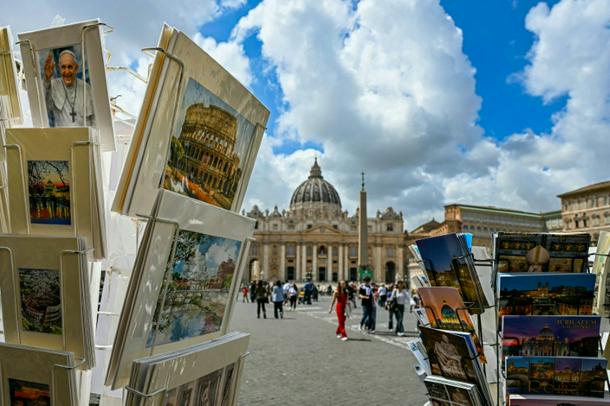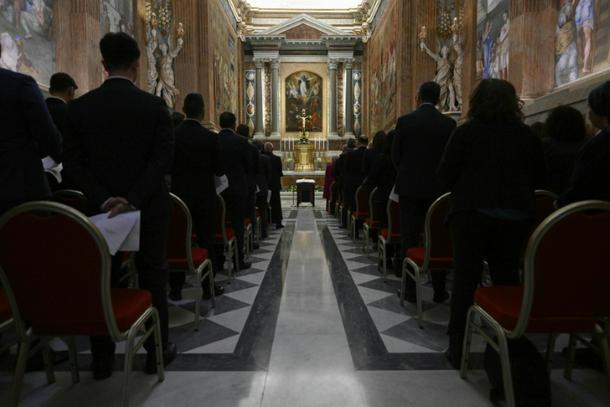
Cardinals will gather for a conclave to elect a successor to Pope Francis
Vatican City (AFP) - Cardinals will on Tuesday begin moving into the Vatican accommodation where they will stay during the conclave, on the eve of their historic, secretive meeting to elect a new pope.
Following the death of Pope Francis on April 21, 133 cardinal electors will gather on Wednesday in the Sistine Chapel to select from among their number the new leader of the world’s 1.4 billion Catholics.
They normally stay in the Vatican’s Santa Marta guesthouse, which has en-suite bathrooms and hotel-style room service, but there are not enough rooms for them all.
As a result, some of the cardinals will be housed at Santa Marta Vecchia, a building next door usually used to accommodate Vatican officials, with rooms allocated by drawing lots.
With representatives from 70 countries across five continents, this conclave is the largest and the most international ever.
Some 80 percent of the cardinals were elected by Francis, an energetic reformer from Buenos Aires who helped open up the Church during his 12-year papacy.
But experts warn against assuming they will choose a progressive in his mould, and many conservatives are hoping for someone who will turn the focus back onto key doctrine.
The 2,000-year-old Catholic Church has huge global influence but is struggling to adapt to the modern world and recover its reputation after the scandal of widespread child sex abuse by priests.
For the past fortnight, cardinals from across the world have been holding near daily preparatory meetings to discuss the challenges – and what they want and need from their new leader.
In the final meeting on Tuesday morning before the conclave, they discussed Francis’s reforms – on tackling abuse and on Vatican finances, among others, according to press spokesman Matteo Bruni.
They also discussed divisions within the Church and the need for a pope to bring hope, he said.
Francis dedicated many of his pronouncements to calling for peace around the world, notably in the Middle East and Ukraine.
In a statement, the cardinals noted “with regret” the lack of progress towards ending those conflicts, calling for ceasefires and negotiations without preconditions.
- ‘Five or six contenders’ -
The cardinal electors – those aged under 80 – will gather for a mass on Wednesday morning ahead of the conclave, which begins at 4:30pm (1430 GMT) that afternoon and could last several days.
Both Francis and his predecessor, Benedict XVI, were elected within two days but the longest papal election in Church history lasted 1,006 days, from 1268 to 1271.
More than a dozen names are circulating as potential frontrunners, from Pierbattista Pizzaballa, the Latin Patriarch of Jerusalem, to Hungarian conservative Peter Erdo.
But with no candidate lists and no campaigning, and given the diversity of the electors, many experts warn there could be a surprise.
Franco-Algerian cardinal Jean-Paul Vesco said the preparatory meetings – which include electors aged under 80 as well as older cardinals – have helped bring together a very disparate group.
“We’ve come from so many countries, many of us had never met before. Finally we have got to know each other,” he told Italy’s Corriere della Sera newspaper.
There are “at least five or six” contenders, he said.
“There were the so-called ‘natural’ candidates, those already known for their role and personality. And there are those who speak and make you think ‘that is strong’.”
“But there is no-one who ‘trounces’ the others, who you think ‘he’s the one’. Yet it will happen”, Vesco said.
- ‘Living history’ -
At the Vatican on Tuesday, tourists mulled over what they would like to see in the new pontiff.
“He must not be too closed-minded. He must support young people who have different values than us,” said Mexican tourist Veronica de Garcia, 30.
But “a pope who is in favour of abortion is unthinkable, because there are things that cannot be negotiated”, said Enzo Orsingher, 78, from Rome.
The cardinals are sworn to secrecy, risking excommunication if they reveal what happens in the conclave, and are forbidden from contacting the outside world until they have a decision.

Employees assisting the cardinals in the conclave take an oath of secrecy
The Vatican announced late on Monday that it would cut the phone signal within the tiny city state from 3:00 pm on Wednesday until a new pope is elected – although this will not affect St Peter’s Square.
Required to leave their mobile telephones behind when the voting process begins, the cardinals will let the world know their progress by burning their ballots to produce smoke – black for no decision, white for a new pope.
The staff who will support them during the election, from medics to lift operators, canteen and cleaning staff, are also bound to secrecy, and took their own oaths on Monday.